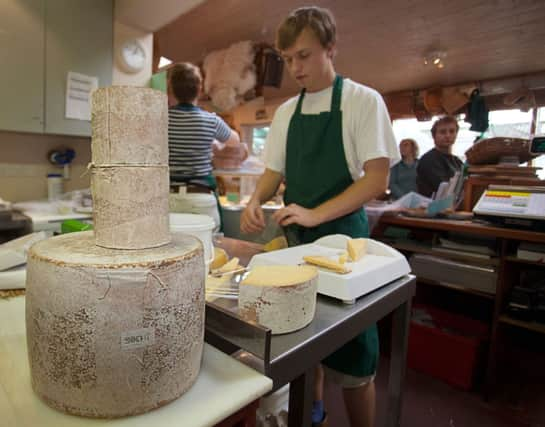Scottish cheese recalled due to deadly bacteria


Batches of the award-winning Loch Arthur Creamery Criffel cheese have been deemed risky for certain people, including pregnant women, young children and anyone with an illness leading to reduced immunity.
The recall is the second time in less than a year that the same cheese has had to be removed from sale because of the presence of Listeria monocytogenes.
Advertisement
Hide AdAdvertisement
Hide AdThe Loch Arthur Creamery, based at the Camphill Community in Dumfriesshire, withdrew the Criffel cheese from sale last February, followed by a recall of all of its dairy products, after testing revealed bacteria contamination.
“Loch Arthur Creamery has recalled batches of its Criffel unpasteurised cheese, because Listeria monocytogenes has been detected in the product,” said a statement from the Food Standards Agency yesterday. “Listeria monocytogenes can cause illness in certain groups such as pregnant women, unborn and newborn babies, and anyone with reduced immunity, particularly the over-60s.”
The batches affected were produced on 11 and 15 November. Consumers who have purchased the product have been advised not to eat it and to return it to the shop where it was purchased. It is not thought that anyone has fallen ill as a result of eating the cheese.
The creamery, which was established in 1985 and supplies shops throughout Scotland, is part of the Camphill Community, which provides a “shared community” for people with special needs and volunteers. It has become well established as a cheesemaker and its products – particularly the Criffel cheese – have won accolades from the British and World Cheese Awards and at the Royal Highland Show.
Barry Graham, manager of food production at Loch Arthur, said the levels of bacteria found were “extremely low”. “It is very important to emphasise that it is a very small issue,” he said. “However, paramount for us is human safety and health.”
It is believed that the cheese tested negative for the bacteria when it left the creamery, but subsequent testing by Dumfries and Galloway Council found low levels in a specific sample.
“We don’t know what has happened,” said Mr Graham.
“However, I do believe that this cheese is very unlikely to make anyone ill in the low levels it is showing currently. Where the risk comes is if it was stored badly subsequently – if people leave it hanging around in a room or do not consume it quickly. That is when any bacteria present have a chance to grow.”
Pregnant women and the in-firm are often advised to avoid food products which could be a high risk for listeria, including unpasteurised cheeses, smoked salmon, deli meats and pate. It can also be found on fruit and vegetables grown in soil.
Although it is fairly rare, listeria causes more deaths from food poisoning in the UK than other food-borne bugs. Most people infected with listeria are hospitalised and approximately a third die.